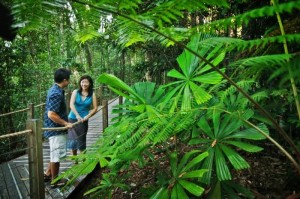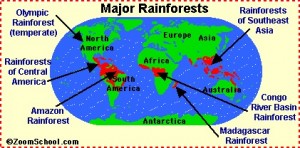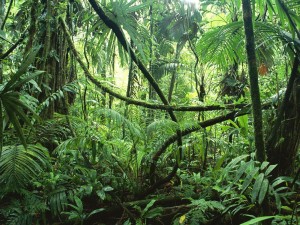Seniors Who Love Rainforests
That would be my wife, she’s wild about rainforests. She could not wait to walk through one on Maui and she enjoyed every step as we walked along a trail with overhanging vines, mud puddles and huge exotic trees. Rainforests exist throughout the world but many seniors never have an opportunity to experience one firsthand.
The word rainforest was first used at the end of the 19th Century to describe forests that grow in constantly wet conditions. Although they cover less than 2 percent of the Earth’s total surface area, the world’s rainforests are estimated to be home to half of the Earth’s plants and animals.
Today, scientists define rainforests as forests that receive more than 2,000 mm of rain evenly spread throughout the year. Some prefer to just call it a “Jungle” as often there is a thick tangle of vegetation, through which people have to force and cut their way.
USA Today has a terrific Travel Section with a listing of the major rainforests. This one is worth reading if you, like my wife, are enthralled with rainforests.
I’m confident that in addition to the amazing beauty associated with rainforests, the fact that more than half of the world’s species of plants and animals are found in the rainforest also weighs in on my wife’s adoration of them.
The wide array of flora and fauna attracts many seniors to areas that are often hidden and not easily accessible. The National Cancer Institute estimates that 70 percent of the anti-cancer plants identified so far are rain forest plants.
The Amazon Rainforest Calls to Senior Travelers
The amazing Amazon Rainforest is an area under exploration. It covers about 3 million square miles – that’s about 60 times bigger than the whole of England. Wow! It is a fact that this natural rainforest emits and absorbs vast quantities of CO2 and the globe is dependent upon this undisturbed area to monitor atmospheric CO2 levels.
Rainforests are the “lungs of our planet”. It is estimated that more than 20 percent of Earth’s oxygen is produced in the Amazon Rainforest. Unfortunately, many rainforests are being raped for their timber and ores. Native people are being pushed out of their homeland. Deforestation is a main culprit, especially in Brazil.
National Geographic Joins In
In Brazil, which houses 30 percent of the remaining tropical rain forest on Earth, more than 50,000 square miles of rain forests were lost to deforestation between 2000 and 2005.
Biologists worry about the long-term consequences. Drought may be one. Some rainforests, including the Amazon, began experiencing drought in the 1990s, possibly due to deforestation and global warming.
Efforts to discourage deforestation, mainly through sustainable-logging initiatives, are underway on a very limited basis but have had a negligible impact so far. So pack up your umbrella and enjoy a rainforest as soon as you can. And thanks for coffee this morning. jeb




